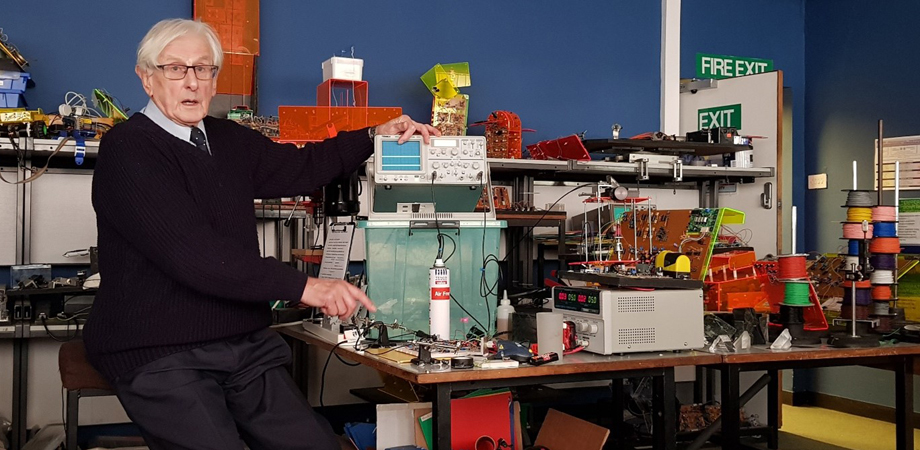Ray Davies, director of the Photonics Academy of Wales at Bangor (PAWB) passed away 14 January 2021. He was 85 and still actively engaged in photonics education, co-supervising three final-year project with students in the School of Computer Science and Electronic Engineering at Bangor University.
His longevity in educational activity is complemented by a quite remarkable educational career path. Having been a physics teacher at Manchester Grammar School for over 25 years, he began working in higher education with the Physics Department of Salford University where he remained for 12 years. Then, on the invitation of Dave Rimmer, director of Technium OpTic in St. Asaph at that time, Davies began his association with the Photonics Academy of Wales in 2006. Following changes at OpTic, Ray transferred his activity to Bangor University in 2011.
When asked to define the age range of his target audience for disseminating an understanding of optics and photonics, Davies indicated "8 to 80." He practiced what he preached: his engagement with the younger end of that age spectrum was encapsulated in sessions held at primary schools. With the school bell having rung for the end of the day and groups of parents outside anxiously waiting for their offspring to appear, the pupils were oblivious to both and were simply determined to complete the task at hand. That task was the design of a "Magical Home" wherein the use of photovoltaics was to be deployed to maximum effect.
The key aspect was that the designs were the work of the children, and this typified Davies' approach when working with all age groups. He would initially introduce a concept or a property of light, and then ask his audience to use that aspect of light to devise a novel device or system of societal benefit.
When the SPIE/OSA Education and Training in Optics and Photonics (ETOP) conference was held in Technium OpTIC in 2009, Davies took full advantage to display his approach to delegates from across the world. Further engagement with ETOP included the paper "Getting Light to Work: photonics up-skilling for industry" presented at ETOP, Oporto, Portugal in 2013.
Having played an active part in the UN's International Year of Light, an outline of those activities was presented in the paper "Public engagement with photonics: International Year of Light celebratory event in Wales," at ETOP'15, Bordeaux, France in 2015. Further elaboration of those activities was described in the presentation "Inspiration, imagination, and implementation: International Year of Light activities of the Photonics Academy of Wales at Bangor (PAWB)" at the SPIE Optics and Photonics Conference held in San Diego, CA in 2016.
As a person who always enjoyed collaboration, Davies' projects included working with a dance company to create a light-assisted performance at Pontio Bangor, and training a team of primary school pupils for a performance of light-based instruments at the St Asaph Music Festival. He set up his stand at the National Eisteddfod in Anglesey, introducing optics and photonics to an extremely wide audience, and spoke to groups of all ages across Wales and England. More recently, Davies had been involved with the Photo-Electric Light Orchestra (PELO) project which is a Royal Academy of Engineering Ingenious award scheme for projects that engage the public with engineers and engineering, while providing engineers with skills and opportunities in public engagement.
The PELO project, led by Dr Daniel Roberts of Bangor University, inspires children aged between 9-13 in the region to design their own musical instruments by implementing coding skills and by utilising photonics to create a music score that was to be performed at Pontio, the University's Arts and Innovation Centre at the final stage of the project in 2020. Davies was always very fond of the project, providing photonics training to the engineers that would be out delivering sessions at the participating schools. Davies had always indicated that he'd love to see a ‘performance' of photonics projects on stage in-front of a live audience which provided the motivation for the PELO project. Due to the worldwide pandemic that performance has yet to be staged; when possible, PELO will stage this performance in Davies' memory.
Read more in the Ray Davies Tribute from Bangor University.




